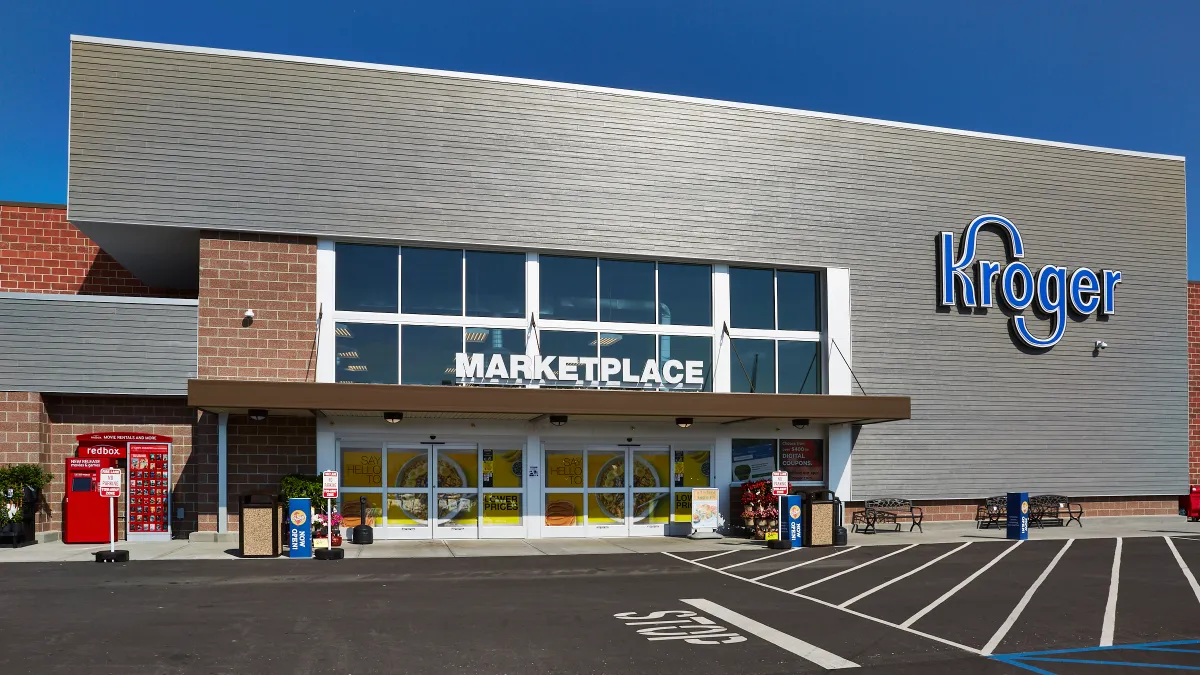Dive Brief:
- Kroger plans to use software and other technology from U.K. grocery automation company Ocado to boost in-store fulfillment of pickup orders starting in 2021, the supermarket chain announced Tuesday. Ocado software will help Kroger workers assemble orders and make it "easier and more efficient" to pick products, according to the announcement.
- The supermarket chain is also adding a 200,000-square-foot automated customer fulfillment center, in the South, to the list of centers it's currently building with Ocado.
- Kroger has now announced locations for 10 Ocado customer fulfillment centers and is extending its partnership to in-store operations as same-day pickup and delivery demand has risen significantly.
Dive Insight:
The economics of pickup are favorable compared with delivery, and Kroger wants to improve order margins further by integrating Ocado's software and other systems.
Picking technology can help employees locate products faster and also batch together orders picked across multiple workers and store zones. Improving the efficiency of fulfillment is seen as a crucial step for grocers as margin-dilutive online orders are expected to remain elevated after the pandemic.
Kroger, which offers pickup from more than 2,100 stores, is looking to press its advantage in a service that has resonated with millions of customers this year. The grocer has heavily promoted pickup recently and waived the $5-per-order fee as it utilizes click-and-collect as a customer acquisition tool.
The new fulfillment center, meanwhile, underscores Kroger’s commitment improving delivery efficiency. The 200,000-square-foot warehouse will be in addition to nine other facilities Kroger has already announced as part of an exclusive partnership the grocery chain struck with Ocado in 2018.
Kroger plans to open its first customer fulfillment center in Monroe, Ohio, within range of Kroger’s Cincinnati headquarters, in early 2021, followed soon after by its facility in Groveland, Florida. The warehouses will be equipped with fleets of rolling robots designed to rapidly gather products, a hallmark of Ocado’s approach to grocery fulfillment.
Some industry experts have been critical of Kroger's plan to rely on large-scale, costly e-commerce as other grocers invest in smaller-scale solutions like micro-fulfillment, but Kroger executives have maintained the tie-up with Ocado includes options beyond the CFCs and have promised more details in the months ahead. The company will hold its annual investor conference in March.
Ocado announced earlier this month that it is acquiring a pair of robotics companies in an effort to boost the efficiency of the fulfillment systems it has developed. Kindred Systems builds robots that use artificial intelligence-powered vision and motion control to identify products, while Haddington Dynamics specializes in low-cost robot arms. In October, Ocado announced it had taken a minority stake in Myrmex, a firm that makes automated click-and-collect systems.
A potential stumbling block for Ocado is that it is currently embroiled in several lawsuits filed by rival AutoStore, which alleges that Ocado’s robotic grocery-fulfillment technology, known as the Ocado Smart Platform, infringes on patents that belong to the Norwegian company.

















